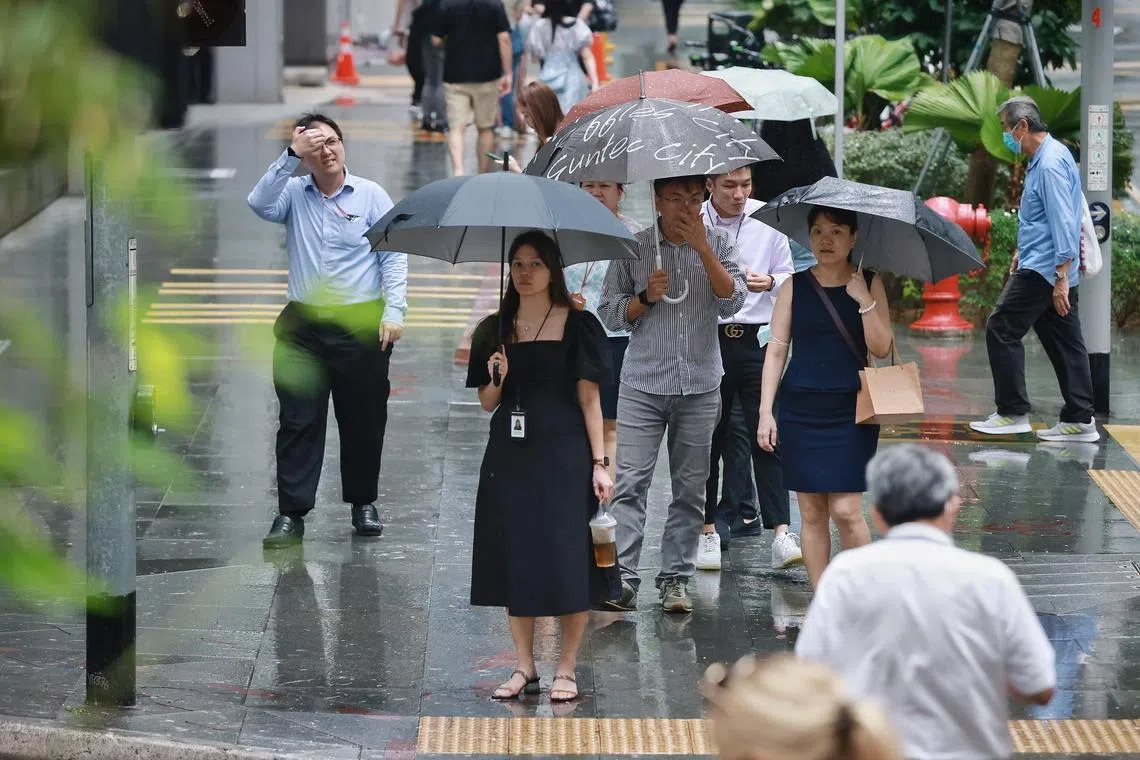Singapore’s approach to employment resilience is to protect workers, not jobs: DPM Wong
Sign up now: Get ST's newsletters delivered to your inbox

Deputy Prime Minister Lawrence Wong said the Citizens' Panel on Employment Resilience was set up as part of efforts to strengthen the SkillsFuture ecosystem.
ST PHOTO: JASON QUAH
SINGAPORE - The SkillsFuture movement will be strengthened, especially in the areas of training and job placement, to better protect workers amid changes that have seen some jobs made obsolete.
Speaking on Saturday at the closing of the Citizens’ Panel on Employment Resilience,
“Our approach in Singapore is to redouble our efforts, not to protect jobs, but to protect workers. To help every Singaporean reskill, upskill and transit more easily to pick up new job opportunities,” he said, addressing the audience at the Career Services Centre at the Employment and Employability Institute building in Jurong East.
To do this, Mr Wong, who is also Finance Minister, said employers need to be engaged as they are the ones who create jobs.
“So employers need to know how they want to grow and transform their business, how to redesign jobs to achieve these goals, and what kinds of skill sets they need for the jobs of the future,” he said.
Training providers are also needed to work closely with employers and industry in designing effective courses to close the skills gap and ensure that those who complete the courses have certifiable skills that will be in demand.
Workers also need to be engaged, through unions and directly, said Mr Wong.
He acknowledged that within the workforce, there are some who require very little help from external parties.
“There will be some who are very clear about what they want to do based on their own skills and aptitudes. They will do their work research, they will undertake training on their own... We want many more people to be like that.
“Unfortunately, for now, I think this group reflects only a small proportion of our workers,” said Mr Wong.
Some may follow the latest fad by going for training in an area that they read about and seems popular, without considering whether it is a good fit for them. Others may not go for training at all because of various constraints, said Mr Wong.
“There may be some who are struggling with finances. And so often for this group, if they are displaced, if they are retrenched for whatever reasons, they will just accept the first job that is offered to them, even though that’s not always the best fit, or the best use of their talents,” he said.
He said the citizens’ panel was set up as part of efforts to strengthen the SkillsFuture ecosystem.
The panel, which held four sessions, was organised by the Institute of Policy Studies and funded by Ngee Ann Kongsi.
Over six weeks, more than 60 participants, comprising employees, employers, employment intermediaries and the unemployed, met to offer recommendations on how to strengthen employment resilience.
On Saturday, the participants presented their final recommendations before Mr Wong and Minister for Manpower Tan See Leng.
Conveyed through skits and presentations, ideas included a lifelong career guide for Singaporeans and government-backed tripartite standards for employee upskilling.
In his address, Mr Wong said not every idea can be easily implemented.
“We would like to have personalised jobs and skills insights provided to every worker. Ideally, you know, you just press a button, you enter some data… Presto, that’s all you need to do.
“But for now, scaling such a system with such a personalised service can be very resource-intensive. It’s not easy to do on a nationwide basis.”

Participants at a session of the Citizen’s Panel on Employment Resilience on Feb 11, 2023.
PHOTO: LIANHE ZAOBAO
Mr Wong noted that during the sessions, one group studied unemployment support.
While the Government wants to provide more support to displaced workers so that they can upgrade their skills, there are trade-offs, said Mr Wong.
“One unintended consequence we have seen elsewhere is that very generous unemployment support can inadvertently lead to more people staying unemployed rather than finding a job.
“And so we will need to find ways to avoid these negative outcomes,” he said.
Mr Wong thanked the participants, noting that many had volunteered while juggling work and family commitments.
Mr Anthony Raguram, 26, said he gained a deeper appreciation of the Government’s work through the sessions held over six weeks.
The PropNex real estate agent said: “I definitely gained more insight from industry experts about why certain policies exist as they are right now... and why the Government does things the way it does.”
For Mrs Joanna Khoo, 40, the panel was a good opportunity to let citizens’ voices be heard.
Mrs Khoo, a human resource director at Partior, a fintech company, said: “Whether or not our ideas materalise into policies, it’s a good platform for us to be heard. It gives us the opportunity to express what we would like to see in future.”


